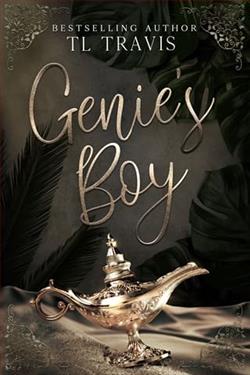Page 11 of Christmas Treasures
He glanced at the label. Pickled golden beets. “I love beets. How did you know?” Total lie. He hated them with a passion.
Her face lit up. “Really? I grew these myself. In my greenhouse. And I learned how to pickle and can them from watching this YouTuber who teaches all these old-timey things like canning. It’s the best.” She abruptly stopped talking,perhaps embarrassed that she’d shown such enthusiasm. He’d never seen her that animated. She was more beautiful than ever.
Normally, he might have tried to keep her talking, but today he was too worried and distracted. He had to come up with a plan in three days’ time to prepare for a huge life change. A child was coming to him, and he had no idea what to do with her. “My family’s been canning vegetables for generations.”
Her expression shifted. Not angry. Not quite. Just wounded. “Right. Once again, I’m a city person with no idea how you Vermont folks do things. Forgive me for acting otherwise.”
“What are you talking about?” He stared at her, baffled.
“You and the rest of this town never cease to remind me that I don’t belong here. I’m an outsider, and I’m not really fully welcomed here.”
“No, that’s not at all what I mean.” He sighed. “I was only trying to say that—it’s great you’re embracing gardening and canning.”
“How gracious of you,” Charlie said. “If not patronizing.”
He drew in a deep breath, hoping to keep his temper in check. This woman had a way of pushing his buttons. All the wrong buttons. “I didn’t mean it that way. I have a lot on my mind, so I might not be expressing myself properly.”
She seemed to soften a little. “Sorry. Again.”
This one could really change from one extreme to the other in a split second. Now she was being compassionate? Or was he misreading her again?
“It’s okay. Really.”
Charlie nodded and started backing away. “Okay, well, I should go. I hope you enjoy my beets.”
He simply didn’t have the energy to try to smooth things out between them. She was impossible to be with friendswith, even for someone like him who could win most people over. “Thanks again for bringing these.” Could it be more awkward between them? To think he contemplated asking her out. How misguided was that idea?
She nodded curtly, then stomped away without a backward glance.
Just as well. He had enough to deal with besides figuring out what the heck was up with her.
The Hayes familyfarmhouse sat at the top of a slow, rolling hill, its wraparound porch draped in twinkle lights. Max parked his SUV and sat for a minute, gripping the steering wheel.
He hadn’t told anyone in his family about the time he’d spent in Florence with Lucia and Bianca. If someone were to ask him why—which he suspected his parents would be doing in a short time— he had no idea how to answer. It had been a time in his life that almost felt like a dream now.
He’d arrived in Florence in October and had immediately known he would like to stay for an extended period. He applied for a job at a trattoria where he’d enjoyed a ragù and glass of Chianti on his first night in the city. Lucia had hired him to help the cook and to do whatever needed doing, whether it was serving customers or assisting in the kitchen. The trattoria was a neighborhood favorite, with rustic decor and pasta that melted in one’s mouth. He’d loved every minute of his time there, including a whirlwind romance in one of the most romantic cities in the world. He’d fallen fast and hard for the brown-eyed beauty and her little daughter.
Rosella was Bianca’s paternal grandmother. Her son had died when Bianca was only eight months old. Rosella had come to help Lucia after the funeral and had decided to stay.She’d taken care of Bianca while Lucia worked. By the time Max met them, they’d been a well-oiled family unit. One they’d welcomed him into.
He and Rosella had become great friends, even though his Italian was not the best. Then, six months in, Lucia started feeling off—as she put it, tired and lethargic. Max had convinced her to see a doctor. Two weeks later, they had a cancer diagnosis. A rare type of blood cancer that had spread throughout her body. Three months later, she was gone.
During her illness, he and Nonna Rosella had taken turns caring for Lucia and Bianca while trying to keep the restaurant afloat. But after Lucia passed, Rosella decided to take Bianca back to the village where she’d lived most of her life. Max had promised to send money when he could. He’d also promised Lucia that should anything happen to Rosella, he would take Bianca. It had seemed like the right thing to do at the time. But now, faced with the actual reality of a little girl he didn’t know coming to live with him, the agreement seemed foolish on all their parts.
That said, he knew how rough Rosella had had it. At age seventy-five, raising a child had not been easy, especially given their financial difficulties. That it hadn’t occurred to him that she might pass away before Bianca was grown seemed definitely foolish. In hindsight, he should have helped them come up with a different solution. Surely yanking a child out of their home and village and sending them to a strange place in America was unwise?
But it was too late now. He’d promised. And he was legally bound to keep that promise.
Now he had to tell his parents the truth and beg them for help.
His father met him on the porch with a mug of coffee in one hand, a faded baseball cap shading his silver hair.
“What brings you by?” His dad peered at him closely. “You okay?”
Max offered a tired grin. “I’m all right. But I need to talk to you and Mom about something important.”
Mom appeared behind them in the doorway, a dish towel in her hands. “Come inside where it’s warm. I’ve been worried. You didn’t sound like yourself when we talked earlier.”
Max followed them into the kitchen, the scent of bacon and fresh coffee reminding him of what home smelled like.















